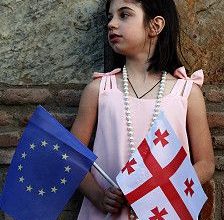Europe has three main problems: unemployment, muslims and neighbors
Europe cannot sleep while America votes. And here is what she needs to do. In order to boldly face the new president of America, our leaders must make progress in three main areas – ensuring employment and relations with Muslims and our neighbors.
Everyone knows what the United States will do this year – the election of a new president. And what will Europe do at this time? Ratification of the EU reform treaty, which is not only completely unreadable, but also does not solve anything anyway? No, we can and must act realistically, and while America is voting, Europe should focus on resolving the three main issues of 2008 – that is, ensuring employment and improving relations with Muslims and our neighbors.
As for employment. The number of jobs must, of course, be increased. But at the same time, it may turn out that in the end we will have even fewer of them than it was – since Asians are increasingly competing with us in the global labor market. We need jobs in order to combat the social evil of unemployment, increase the well-being of workers and take care of the aging population of our countries. In Europe, we have a smaller share of the working population than in America, and our working day is shorter than that of the Americans. President Sarkozy, who returned to France after exploring the Egyptian pyramids in the company of a new love of his life with the promise of “freeing up labor,” showed a tough and simple understanding of the situation: “While others are working harder, we are not working enough.” If by the fact that we “have to work more” do not mean that we need to work longer for a lower salary, then we need to work smarter: use our knowledge, notice gaps in global markets on time and make full use of those people whose talents are not today find applications. And, since Europe must also be ahead of the world in the environmental plan, all these jobs should also be “low-carbon”. In the context of the credit crisis and imported oil at a hundred dollars per barrel.
The main forces who can accomplish this task are individual entrepreneurs, companies, trade unions and national governments, primarily working in Germany and France. The European Union as such can only provide secondary assistance. Or at least it should not interfere with what we are seeing in the mass of cases when the regulation of the social sphere and the field of healthcare and labor protection blocks the very productive forces that are being released through liberalization of the single European market and antitrust policy. In a good way, this year all European bureaucrats-“regulators” should be brought to the economic oath of Hippocrates – “Do no harm.” This means that at every turn they should ask themselves: “And is this directive, is it actually necessary for anyone?” And if the answer is no, throw it away without regret.
As for the Muslims. As my diary tells me, today is just the first day of the year 1429, according to the Muslim calendar, of the year. On this day, Europe must finally recognize that we and our Muslim population have very special problems. There is no need to deceive yourself and think that we have friction only with people of Muslim faith – just in the Basque Country, for example, two ETA terrorists were arrested, accused of organizing an explosion in Madrid airport in 2006. However, for the authorities of most Western European countries, relations with Muslim residents are becoming the most serious problem that a society of cultural diversity poses to them.
In the UK, a dental technician, Sohail Qureshi, a Pakistani native, has recently been convicted. This is one of the first court decisions on the newly invented article “preparing for the commission of a terrorist act” in which Kureshi pleaded guilty, and this is just one of many indications of what awaits us in the worst case. The fact is that such convinced jihadists are always surrounded by a certain “inner circle” of sympathizers – such as, for example, the “lyrical terrorist” Samina Malik, with whom Kureshi corresponded by e-mail, asking about the features of the security service of Heathrow Airport, where she she worked for WH Smith, and the “farther” agency, consisting of many young Muslims who have ambivalent feelings about the society in which they grew up.
On the other hand, on the pages of our tabloids one can often see real hysteria regarding all Muslims without exception, or, more broadly, “Islam.” In addition, the restriction of civil liberties and freedom of speech in the name of both the fight against terrorism and “respect” for the characteristics of a multicultural society cannot but worry. For example, if we take the evidence that I personally saw in the media, then Kureshi, of course, should be convicted, but Malik in court simply has nothing to do. Fortunately, over the past year, some positive shifts have taken place among British Muslims: former Islamists actively advocate the open acceptance by Islam of the basic norms of a free society.
Equally contradictory trends can be observed today in France, Germany, Italy, Spain and the Netherlands. Both their similarities and the differences between them are obvious. They flow not only from different traditions of integration, features of national identity in host European countries, citizenship systems, but also from social differences between countries from which the first generation of Muslim migrants arrived in Europe. For the children and grandchildren of many of them, Europe has become a “second homeland,” and this concept is emotionally highly controversial. Roughly speaking, Germany is lucky that most German Muslims come from Turkey – let’s say, a near-European country; France and Spain were simply unlucky – immigrants enter there mainly from the Maghreb countries; and the UK is in the worst position, especially considering what is happening in Pakistan today. Qureshi, by the way, was arrested when he tried to board a plane bound for Pakistan.
If the face of the problem is different from country to country, then the solution to this problem should also be national. France, Germany and the United Kingdom will respond to this particular problem based on some common liberal elements, but it will become easier for people not to feel like they are 100% Europeans, but Muslims (or “former Muslims,” post-Muslims, call it want) and at the same time the French, Germans or British. And, as in the case of solving the problem of creating European jobs, in solving the problem of creating Muslim citizenship, EU assistance can only be of a secondary nature.
However, with the third priority problem – relations with neighbors – this is absolutely not the case. Here, the EU can play a decisive role. At the moment, the world’s largest trading block does not squeeze its full capacity. The economic giant is becoming a political dwarf. Citizens of the “old” and “developing” great powers of our world – Americans, Chinese, Russians, Indians – hardly hide their contempt for the EU as a political entity, and those who have heard of it, and this is far from all.
Potentially, the influence of the EU could line up in three circles. The inner is the “circle of expansion.” The EU’s main asset is its ability to turn its neighbors into its members, and it is because of this that in so many countries – from Spain in the 70s to today’s Croatia – the change of political regime has been so peaceful. It is an asset that no other power in the world has. Fifty years ago, the United States consisted of 48 parts, and the newly created European Economic Community – of six. Today, America has 50 states (Alaska and Hawaii joined them in 1959, and this was the last stage of US expansion), and the EU has 27 states, and one of them, Slovenia, did not exist 20 years ago, and now it already in the order of priority, it performs EU presidency and advocates for the acceleration of the “association agreement” with Serbia, with which it, as part of the former Yugoslavia, was constantly at enmity. And we must support this process in every way and open the way for the rest of the Balkans, Turkey and Ukraine, which will ultimately lead them to EU membership.
The middle circle includes states with which we are geographically neighboring, but they will never become EU members. This is a huge arc torn by conflicts and for the most part undemocratic countries, stretching from Marrakesh to Murmansk. With regard to these neighbors, EU policy exists only on paper. So, by the end of this year, we need a policy consisting of real affairs.
And the third circle is the great powers of the new multi-polar world, global neighbors in the broad sense of the word, among which the EU rightfully should play one of the leading roles, but today it is hardly recognized in that capacity. In the coming year, at least the first steps must be taken here.
Of course, you can list many more key areas – from combating climate change to sustainable development. But if the EU manages to do something in the three designated areas – jobs, Muslims, neighbors – then in January 2009 European leaders will not be ashamed to face the new president of America – and they will have something to sit down at the negotiating table with.
Timothy Garton Ash
This post is also available in:
 English
English  Русский (Russian)
Русский (Russian)




